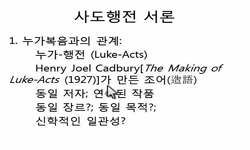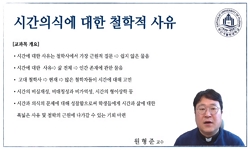이 논문은 역사비평과 문학비평을 사용하여 양원적 정신의 붕괴로 인간 의식이 기원했다는 줄리언 제인스(Julian Jaynes)의 이론을 사도행전 본문에 적용하여 어떻게 양원적 정신과 주관적 의...
http://chineseinput.net/에서 pinyin(병음)방식으로 중국어를 변환할 수 있습니다.
변환된 중국어를 복사하여 사용하시면 됩니다.
- 中文 을 입력하시려면 zhongwen을 입력하시고 space를누르시면됩니다.
- 北京 을 입력하시려면 beijing을 입력하시고 space를 누르시면 됩니다.

사도행전의 인간의 의식 ‐ 줄리언 제인스의 양원적 정신과 초기 그리스도교 신앙의 발달 = Human Consciousness in the Acts of the Apostles: Julian Jaynes’ the Bicameral Mind and the Development of the Faith of Early Christianity
한글로보기https://www.riss.kr/link?id=A109117151
-
저자
조재형 (강서대학교)
- 발행기관
- 학술지명
- 권호사항
-
발행연도
2024
-
작성언어
Korean
-
주제어
Bicameral Mind ; Acts of Apostles ; Consciousness ; Faith of Christianity ; Julian Jaynes ; 양원적 정신 ; 사도행전 ; 의식 ; 그리스도교 신앙 ; 줄리언 제인스
-
등재정보
KCI등재
-
자료형태
학술저널
-
수록면
69-92(24쪽)
- 제공처
-
0
상세조회 -
0
다운로드
부가정보
국문 초록 (Abstract)
이 논문은 역사비평과 문학비평을 사용하여 양원적 정신의 붕괴로 인간 의식이 기원했다는 줄리언 제인스(Julian Jaynes)의 이론을 사도행전 본문에 적용하여 어떻게 양원적 정신과 주관적 의식의 발달이 사도행전 본문 안에서 나타나서 초기 그리스도교 신앙의 발달에 영향을 주었는가를 연구하는 것이다. 인간의 의식은 철학적 관점, 현대 과학자들의 관점, 언어학적 관점, 구술성-문자성의 관점에서 살펴볼 수 있다. 이 가운데서 양원적 정신은 구술성-문자성 이론을 근거로 하는데, 제인스는 구술성-문자성 이론을 종교와 의식 영역에 적극적으로 적용하여 구약성서와 호메로스의 서사시와 몇몇 제한된 신약성서 본문을 포함하여 연구했지만, 사도행전 본문은 다루지 않았다. 그렇지만 그는 구술성에 입각한 인간의 정신은 문자성에 근거한 의식과 다름을 잘 지적하였다. 사도행전의 본문은 예수의 말씀은 거의 나타나지 않지만, 성령에 의한 인간의 무의식적인 반응이 잘 나타나기에 다른 신약성서 본문보다 인간의 의식을 양원적 정신으로 분석하기에 적합하다.
사도행전에 묘사된 초기 그리스도교인들은 하나님 또는 예수와 성령의 목소리를 직접 들을 수 있었기 때문에 아무런 주저함 없이 그 명령을 따라 집단으로 순종할 수 있었다. 방언과 치유와 기적은 이러한 양원적 정신을 통해 나타난 신의 목소리의 권위가 그 지도자들(사도와 선택된 자들 등)에게 위임되었다고 설명할 수 있다. 사도행전 전반부(특히 1-2장)에 현저하게 나타났던 폭발적인 성령의 사역은 후반부로 갈수록 약화한다. 이러한 약화는 필연적으로 직접적인 신의 목소리 대신에 간접적인 방식으로 그 접촉을 유지하려고 한다. 다른 한편으로 양원적 정신은 사도행전에 반영된 초기 그리스도교가 일치단결해서 빠르고 강력하게 복음을 전파하여 성장하는 모습을 잘 보여주지만, 이러한 빠른 성장의 이면에 발생하는 여러 문제도 함께 보여준다. 가장 큰 문제는 어느 때는 강력하게 들리던 신의 목소리가 어느 때는 잘 들리지 않게 되고, 이러한 혼란한 상황은 주관적 의식을 발생시킨다. 그러므로 이 논문은 사도행전에서 성령의 사역에 의한 교회의 빠른 성장과 복음 전파를 양원적 정신과 주관적 의식으로 연구하여 사도행전의 다양한 종교적 현상(방언, 기적, 성령 체험 등)을 인문학적 방법론으로 설명하여 그리스도교 신앙의 발달과 초기 교회의 탄생과 성장을 잘 보여준다.
다국어 초록 (Multilingual Abstract)
This paper, by using historical and literary criticism, applies Julian Jaynes’ theory that human consciousness originated from the collapse of the bicameral mind to the text of the Acts of the Apostles, and studies how the development of the bicamer...
This paper, by using historical and literary criticism, applies Julian Jaynes’ theory that human consciousness originated from the collapse of the bicameral mind to the text of the Acts of the Apostles, and studies how the development of the bicameral mind and consciousness appeared in the text of Acts to influence the development for the faith of early Christianity.
The investigation of human consciousness can be approached from multiple perspectives, including philosophical, scientific, linguistic, and orality-literacy viewpoints. Among these perspectives, the bicameral mind theory aligns with the orality-literacy framework. Jaynes actively applied the orality-literacy theory to the domain of religion and ritual, analyzing the Old Testament, Homer’s epic poems, and limited New Testament texts. While he did not specifically address the Acts of the Apostles, he noted the distinction between a consciousness rooted in orality and one based on literacy. The text of the Acts of the Apostles hardly contains the words of Jesus, but it is more suitable for analyzing human consciousness with a bicameral mind than other New Testament texts because the unconscious response of human beings by the Holy Spirit is well shown.
The early Christians described in Acts could directly hear the voice of God, Jesus, or the Holy Spirit, so they could collectively obey its commands without any hesitation. Tongues, healings, and other miracles can be explained by the authority of the voice of God manifested through this bicameral mind delegated to its leaders (apostles and deacons, etc.). The explosive work of the Holy Spirit, which was prominently displayed in the first half of the book of Acts (especially chapters 1-2), weakens as it goes into the second half. This weakening inevitably seeks to maintain that contact in an indirect way instead of directly with the voice of God. On the other hand, the bicameral mind shows how early Christianity, reflected in the book of Acts, grew by spreading the gospel rapidly and powerfully in unity, but also shows various problems that arose behind this rapid growth. The biggest problem was that the voice of God, which was once heard powerfully, now becomes difficult to hear; this chaotic situation generates subjective consciousness. Therefore, this study investigates the church’s rapid expansion and the spread of the gospel in the Acts of the Apostles, considering the bicameral mind and subjective consciousness. Employing a humanistic methodology, this paper elucidates various religious phenomena depicted in the Acts of the Apostles, such as speaking in tongues, miracles, and experiencing the Holy Spirit, which shows well the origin of the faith of the early Christianity and the rapid growth of the early church.
동일학술지(권/호) 다른 논문
-
유다‐다말 내러티브에서 나타나는 형사취수제에 대한 사회적 강조 ‐ 창세기 38장 6-26절에 대한 분석
- 장로회신학대학교 기독교사상과문화연구원
- 서창립
- 2024
- KCI등재
-
탈북민을 위한 기독교적 이야기치료 ‐ 트라우마 치료방안
- 장로회신학대학교 기독교사상과문화연구원
- 이재현
- 2024
- KCI등재
-
노인들의 전인적인 욕구에 근거한 기독교노인교육 프로그램 연구
- 장로회신학대학교 기독교사상과문화연구원
- 김성중
- 2024
- KCI등재
-
던칸 B. 포레스터(Duncan B. Forrester)의 공공신학에 관한 연구
- 장로회신학대학교 기독교사상과문화연구원
- 김승환
- 2024
- KCI등재




 KCI
KCI DBpia
DBpia






